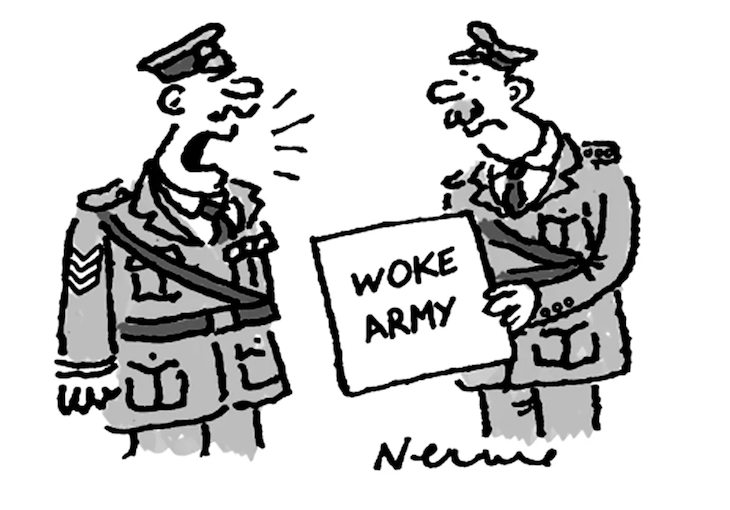The British Army – at its smallest size since we lost our American colonies in the 1770s – is facing the most challenging period in its history. More soldiers are leaving than joining. Why are they walking away? A sternly-worded letter from the Deputy Chief of the General Staff (DCGS), Lieutenant General David Eastman, rebuking colonels for their dealings with private members’ clubs, shows one reason why many are fed up with the Army.
Eastman is concerned that the Army’s intended status as a ‘modern, inclusive, and forward-thinking organisation’ might be undermined
Eastman is concerned that the Army’s intended status as a ‘modern, inclusive, and forward-thinking organisation’ may be undermined by ‘associations with private members’ clubs whose rules, policies, or cultural practices may not align with the Army’s commitment to inclusivity’. He is not, as you might initially imagine, thinking solely of clubs which do not admit women as members, but also ‘those where membership rights, access, or participation differ on the basis of gender’.
If corps or regiments do have associations with clubs like these, Eastman provides a stark binary choice: ‘engage with the relevant clubs to discuss their policies and advocate for change’, or else ‘take steps to disassociate from the organisation’.
At a time of crisis for the British Army – and given the dangerous world we live in – is this really a priority? Russia’s president Vladimir Putin will be laughing, rather than quaking in his boots.
Sceptics should not imagine that associations with private members’ clubs are private or informal matters, Eastman suggests. Tacit endorsement by corps and regiments ‘carries weight’, and association with any club which restricts access or membership ‘risk[s] sending a mixed signal about the Army’s stated commitment to inclusion’. In effect, the Army is always on duty and always being judged.
The Deputy Chief of the General Staff has a wide range of responsibilities: his portfolio includes the Army Legal Services Branch, basing and infrastructure, resource issues and the Royal Army Chaplains’ Department. But it’s not clear that Eastman’s remit should include soldiers’ associations with private clubs.
Even if the army’s top brass don’t like exclusive members’ clubs, it is worth remembering that there is no law proscribing all-male clubs: schedule 16 of the Equality Act 2010 contains a specific exemption from its provisions in terms of organisations ‘restricting membership to persons who share a protected characteristic’, of which sex is one.
Yet this doesn’t stop Eastman going on the warpath. He says that these associations risk ‘undermining the inclusivity and cohesion we strive to foster within our ranks’. That inclusivity and cohesion, Eastman argues, is ‘a central component of our operational effectiveness’. Really?
The message to soldiers appears to be that any association with any organisation which has any restrictions on membership or access is a threat to the fighting capability of the British Army. It is not wholly specious but it is highly contentious. The Ministry of Defence should prepare itself for accusations of allowing ‘wokeness’ to dominate its priorities.
There is another simple but profound issue that Eastman has not grasped or is choosing to ignore. Members’ clubs of any kind cannot, by definition, be ‘inclusive’. We choose not to frame it this way but a club exists at least in part because some people are excluded. Otherwise it is not a club. The Cavalry and Guards Club on Piccadilly, for example, admits current and retired officers from Guards and cavalry regiments, and its membership policy is discriminatory on that basis. More generally, members; clubs discriminate because membership is at their discretion, and no-one is entitled to join.
Women have been able to serve in any role in the armed forces since 2018, and the Vice-Chief of the Defence Staff, the second most senior officer, is a woman, General Dame Sharon Nesmith. They remain only 12 per cent of the regular forces but the government has set a target of 30 per cent by 2030. I say this as a male civilian (although in full disclosure a former member of the Army and Navy Club): structural challenges remain, particularly in relation to childcare provision, flexibility and bullying, harassment and abuse, but I am deeply sceptical that low-key relationships with private members’ clubs loom large.
General Eastman is right to worry about the reputation and perception of the British Army. But his recent letter may well do harm rather than good: it reinforces an image of the UK’s military leadership as lacking in perspective, sense and serious commitment to a fighting force that is capable of undertaking the tasks the government demands of it.








Comments